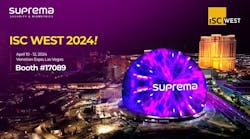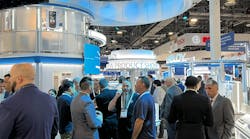ORLANDO, Fla. -- Brigitte Goersch placed her hand on a screen that copied her fingerprints, and she then stood in front of an ATM-like machine that captured an image of her eye's iris.
A private company hopes as many as 30,000 other people this year will follow the lead of the security chief at Orlando International Airport by offering up their biometric information for a program guaranteeing travelers an exclusive security line, and the promise of no random secondary pat-downs, in exchange for a background check by the Department of Homeland Security.
The privately run program debuted Tuesday at Orlando, the first and so far only airport that is trying it out.
Those passengers who pay $80 a year to join the traveler pilot program called "Clear" register by computer either at home or at the airport and give their biometric data at an airport kiosk resembling an oversize ATM machine. The information is then submitted to the Transportation Security Administration. If the passengers are approved, they get a baby blue translucent card that holds a computer chip containing their fingerprints and iris image for quick identity verification. They also earn the right to go through a separate, quicker security lane as soon as July, although they still will need to pass shoeless through an airport metal detector.
"They still will have to go through a security screening, but they won't have to stand in the line that you may encounter when you go to the airport," Goersch said. "It will be an expedited process."
The program will be run by Verified Identity Pass Inc., a company founded by Steven Brill, whose previous ventures include starting the publications The American Lawyer and Brill's Content. Lockheed Martin is a minority partner and developed the technology.
"I think the notion that you can pay a small annual fee to prescreen yourself so you don't have to be treated like a suspect wherever you go, I think that really resonates with people," Brill said.
The idea, though, didn't resonate with airline passenger Sabrina Tirpak, who was traveling to Cleveland with her family and said she wouldn't sign up for the program unless many other airports joined it. She also questioned why the test wasn't started at airports that have more business travelers, such as Atlanta or Chicago, rather than Orlando, whose business is driven by less rushed family vacationers.
"I wouldn't want to do it if it were just at one airport," Tirpak said. "If it were at other airports, maybe I'd do it."
Brill said he is in talks to bring the program to other airports and added that he expects to have 100,000 passengers signed up in three years. Each location requires an investment of more than $2 million up front, he said.
As security measures, the company will separate passengers' names from the personal information it maintains and won't sell customer information to marketing companies, Brill said.
Similar systems exist at some European airports and in five U.S. airports as a part of a free test by the TSA, but the government program has been capped at 10,000 participants and cards at one airport don't work at others. The TSA has set a limit of 30,000 enrollees for the "Clear" program's first year.
Technology will be standardized so that "Clear" cards at one airport work at another and cards produced by one company can be used by another, Brill said.
The Orlando airport had an incentive to sign up with Brill's company: it is getting 18 percent of the revenue generated by the program here. Other airports likely will get similar but not as lucrative incentives.
"We were obviously more aggressive with Orlando since its our first airport," Brill said.


